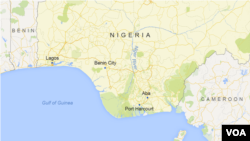Nigeria's government is trying to talk its way out of an unfolding crisis in its oil-producing Niger Delta region, but activists and traditional leaders are divided over whether negotiation is the best solution.
The minister of state for petroleum, Emmanuel Ibe Kachikwu, says the government wants to work with the Niger Delta Avengers, a militant group whose months of attacks on oil pipelines succeeded in reducing Nigeria's oil production by as much as 50 percent.
It is unclear if talks have already begun. An official at the state-owned oil company told VOA last week that the government and the Avengers had agreed to a cease-fire, a charge the group denied on Twitter.
In the Niger Delta's towns and cities, some activists are wondering if sitting down with the militants is a good idea.
"Anybody from anywhere can just pick [up an] AK-47, create hell with the pipelines and expect the federal government to come and negotiate with them," said Anyakwee Nsirimovu of the Port Harcourt-based Institute of Human Rights and Humanitarian Law. "That would be anarchy."
Previous Nigerian governments have negotiated with militants in the delta. An earlier insurgency was quelled in 2009 when former president Umaru Yar'Adua convinced militants to put down their guns in exchange for an amnesty program that provided monthly cash payments and job training.
The Avengers' attacks on oil pipelines started earlier this year and sharply reduced Nigeria's daily production of around two million barrels per day.
The decision to seek talks with the Avengers was a wise one, said Godspower Gbenekama, a member of the traditional ruling council in the Gbaramatu Kingdom, which was the site of several pipeline attacks claimed by the Avengers.
"Military solution is never a solution and can never be a solution. Dialogue is the only way forward," he said, adding that Avenger attacks and military reprisal raids have led to oil spills in Gbaramatu.
But by engaging the Avengers in talks, attorney and human rights activist Oghenejabor Ikimi says that will encourage other militant groups to take up arms just to get the government's attention.
"If not because I'm a lawyer, if I were living in the creeks, I would just form my own [group] too, so the government could just come and dialogue with me," Ikimi said. "But there's no sense in all this."
President Muhammadu Buhari is winding down the amnesty program, which was supposed to buy time for the government to develop the Niger Delta.
Despite being the source of Nigeria's considerable oil wealth, the region is as impoverished as any other part of the country, with bad roads and unreliable electricity.
If the government wants to end militancy once and for all, Gbenekama says, it needs to keep its promise of developing the delta.
"These are aggrieved Niger Delta people," he said. "Immediately [after] the issues of the Niger Delta are addressed, these criminal activities will end."
Hilary Uguru contributed to this report from Warri, Nigeria.











